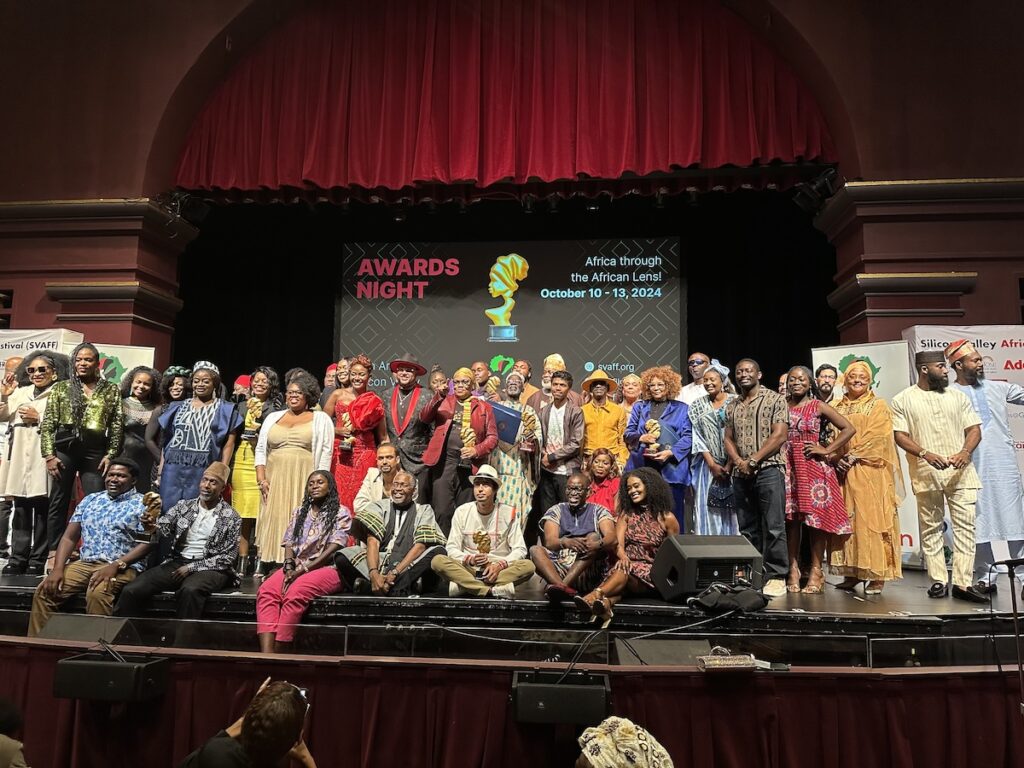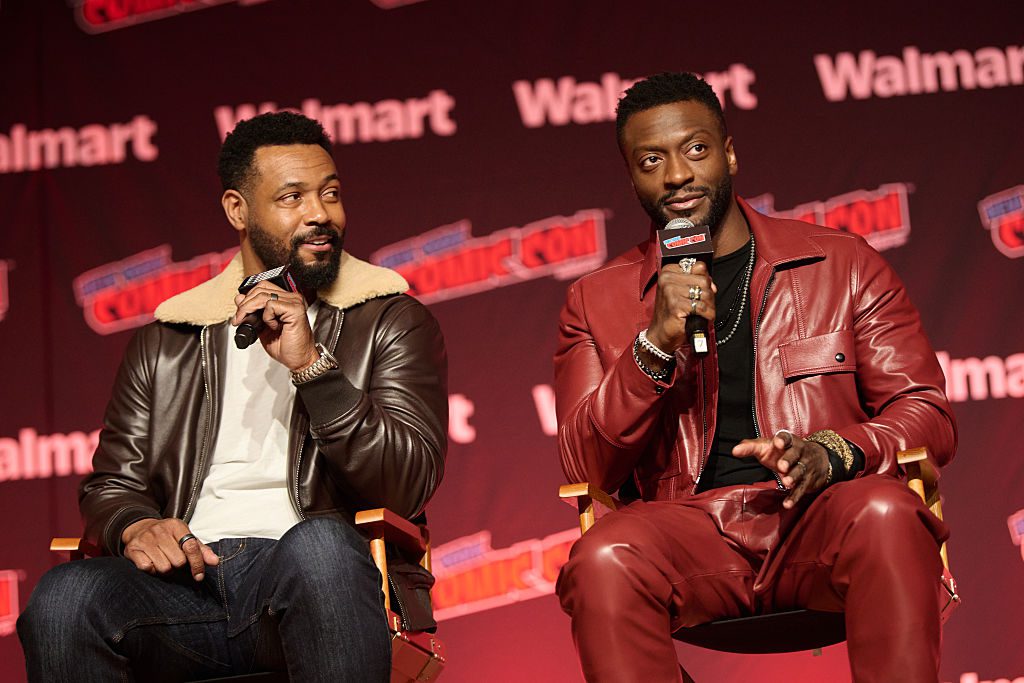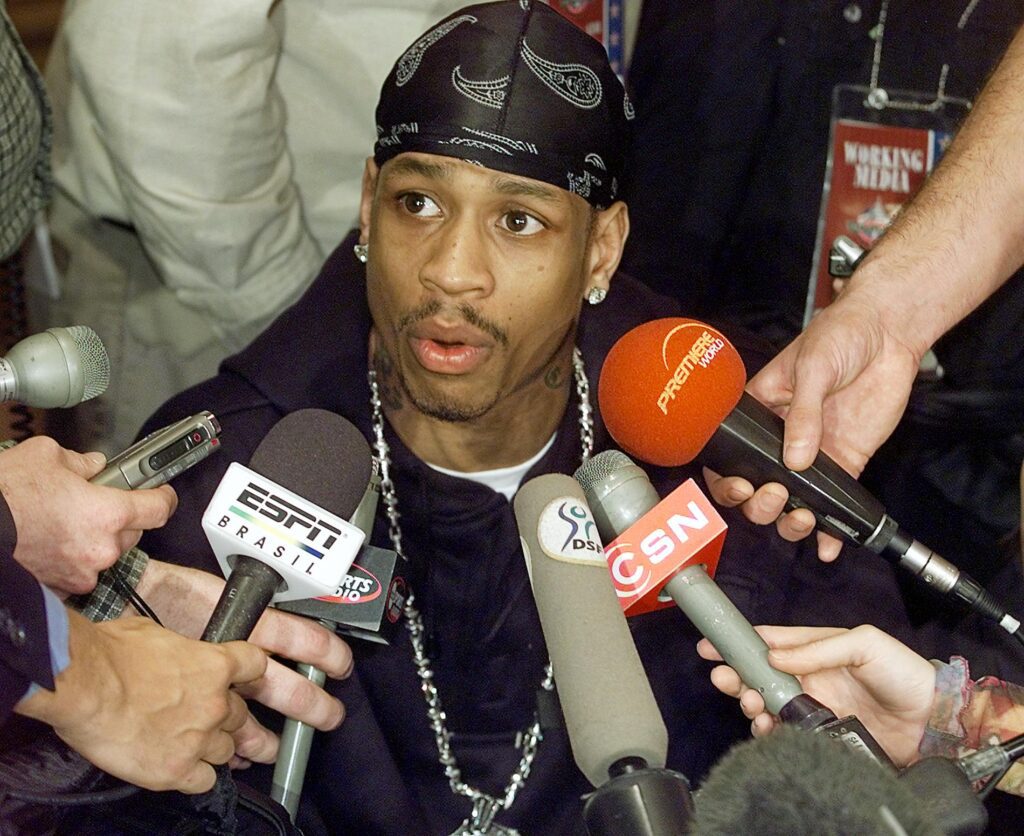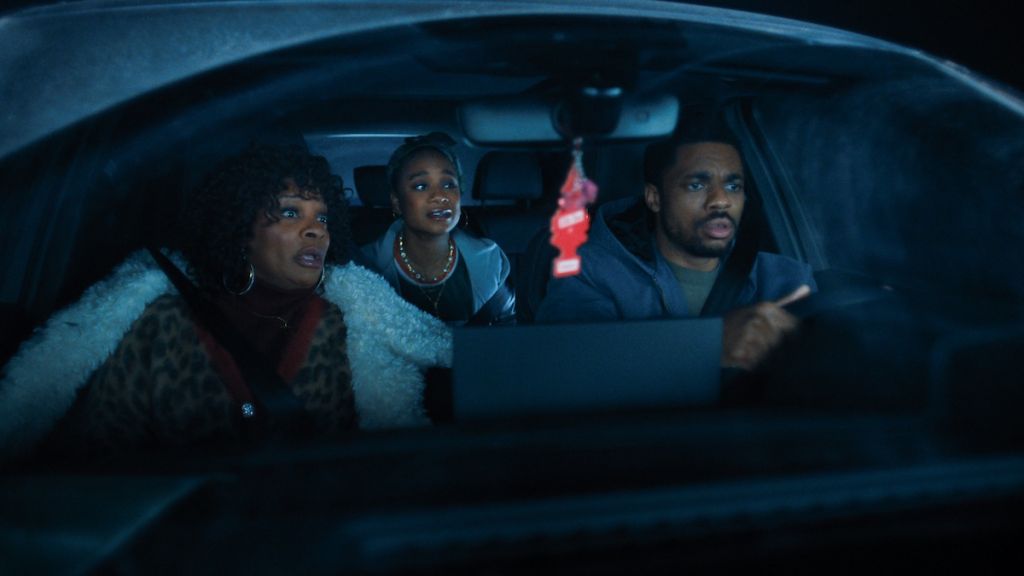Did you know Silicon Valley is home to one of the best festivals for filmmakers from Africa and the diaspora?
Source: Janeé Bolden / Courtesy
Our Sr. Content Director Janeé Bolden attended the 15th Annual SVAFF in San Jose earlier this month and gained insight from founder Chike Nwoffiah and a number of the filmmakers in attendance, including Dr. John Kani, Julie Dash, Souleymane Cissé, and Richard Mofe-Damijo who were all honored as 2024 Cultural Icons during the four-day event.
The SVAFF experience kicked off on Industry Day, two days before the festival’s official opening ceremony, with a visit to YouTube’s office in San Bruno, CA. We were hosted by two employees (members of Black@YouTube) who gave us a tour of the campus, answered questions and provided lunch. This visit was particularly special because we were joined by Souleymane Cissé (often referred to as “the greatest living African filmmaker”). Hailing from Mali, Cissé’s film Yeelen became the first African film to win the Jury Prize at the 1987 Cannes Film Festival. Cissé was also awarded the Carrosse d’Or award at the 2023 Cannes Film Festival. In addition to his global recognition and personal accomplishments, Cissé has served as a guiding light to other African filmmakers through his foundation of the Union of West African Cinema and Audiovisual Designers.
The week continued with the first African Film Summit at San Jose State. Themed Identities and Representations in African Cinema, panels for the event included ‘Decolonizing The Gaze: Reclaiming African Narratives,’ ‘African Cinema in Film Studies Curricula,’ ‘African Women in Cinema,’ ‘The Business of Film & Global Distribution,’ ‘Intersection of Technology and Narrative Traditions’ and ‘African Cinema in Global Media Reporting: Decolonizing the Gaze.’ The summit was followed by a special dinner at Adobe headquarters in San Jose.
Friday, SVAFF welcomed young students to the Historic Hoover Theater for a screening and workshop in the morning. By afternoon the staff rolled out the red carpet for opening ceremonies. The Mayor and local San Jose officials were on hand to take photos with the Cultural Icon honorees.
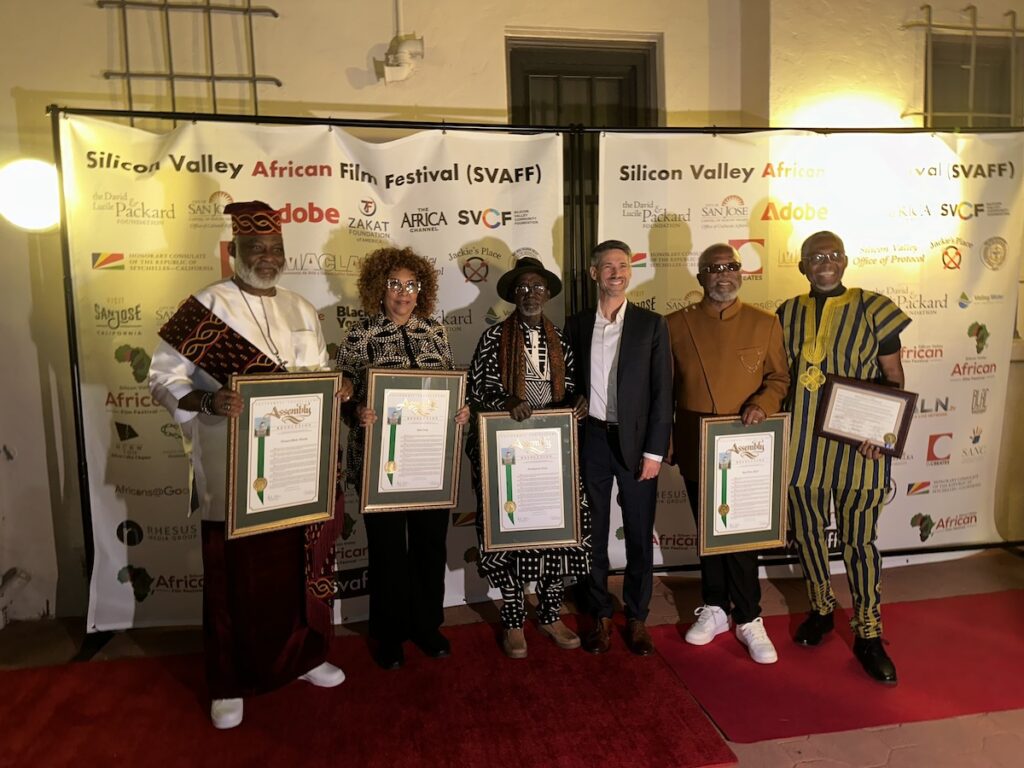
Source: Janeé Bolden / Courtesy
After watching the introductions of this year’s Cultural Icons Souleymane Cissé, Richard Mofe-Damijo, Julie Dash, and Dr. John Kani, attendees were directed into the main theater to watch the opening night films, both from Uganda. The first film, a narrative short called Half Chocolate, Half Vanilla, was directed by Kabuye Nodryn Evanci and tells the story of a young woman struggling with vitiligo who learns to appreciate her unique beauty.
The second film, a narrative feature titled Makula directed by Nisha Kalema and Dan Mugisha, also starred Kalema as a woman who believes she’s fallen in love, only to learn that her newlywed husband is running a black market business involving sex slavery as well as human and organ trafficking.
Saturday, the lawn in front of the Historic Hoover Theater transformed into an African marketplace with clothing, food, and more items available for purchase. Inside the building, films across all genres were shown in three rooms, beginning at 11 am. In the afternoon the festival held a fashion show, featuring intricate looks from African designers. Sunday, films continued to be shown until about 4 in the afternoon, when everyone departed to prepare for closing ceremonies. The event, held at the Montgomery Theater in San Jose was a true cinematic experience. The filmmakers walked the red carpet with djembe drumming and music in the air, as the crowd mingled and enjoyed food and drinks. After heading inside, the awards ceremonies began with a parade of flags, representing the 38 countries represented. One by one, cultural icons Souleymane Cissé, Julie Dash, Dr. John Kani, and Richard Mofe-Damijo were honored, along with actor Ozie Nzeribe, who was recognized with a 2024 Trailblazer Award. The event closed after handing off filmmaker awards for each genre.
Before our arrival at SVAFF, Chike Nwoffiah had offered a fitting description of his festival, “As soon as you arrive it’s like a family BBQ, you come in the back door, you’re going out through the front door.” After experiencing SVAFF we can confirm this to be true. We left feeling inspired, recharged, and connected, with new friendships and partnerships already beginning to blossom.
Visit the SVAFF website for more information about the films shown at this year’s festival, including the winners across all categories.
1. Chike Nwoffiah founded SVAFF in 2009
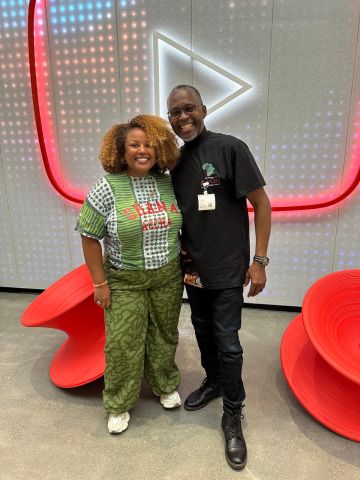
Source:Courtesy
SVAFF was launched fifteen years ago when Nwoffiah began using film as a tool in college classrooms.
“I was teaching at one of the universities here, teaching African history and I would bring short clips by African filmmakers into my classroom to help animate my curriculum and my students were just in awe of what we were seeing,” Nwoffiah recalled. “It was challenging the core of what Africa was or could be. These were short stories, and short films by the storytellers themselves from the continent and that revelation was very clear to me that I needed to take this experience and my students into the bigger Silicon Valley community and invite people to a different conversation about Africa. If only they can sit and hear the Africans and see Africa through the lenses of those Africans…”
Nwoffiah’s first Silicon Valley Film Festival was held on a Saturday for a half day, screening some 10-12 films. This year’s festival spanned four days, with filmmakers from some 38 countries showing 85 films!
2. Industry Day at YouTube
“We have the world headquarters of all these companies here and we have relationships with these companies, the people that work there are human beings like us, and so we try to use the opportunity to expose our filmmakers and get them into these spaces,” Chike Nwoffiah told GlobalGrind. “We’ve received feedback that it helps demystify these platforms for them. If you think about the lonely filmmaker in Sudan or somewhere in Brazil, the idea of YouTube is something they interact with on their computer. To be in the physical space that is actually the building and then meet, greet, and touch human beings that look like them who work in that space, does something to their minds. They get to meet senior executives that look like them, have conversations with them about their operations and all of that, and this is uniquely Silicon Valley.”
3. Celestina Aleobua met her creative partner Naira Adedeji at SVAFF
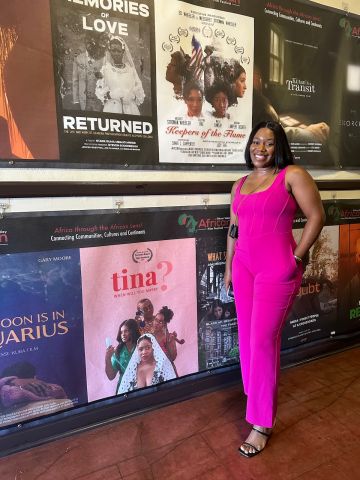
Source:Courtesy
Another favorite from the weekend was Celestina Aleobua’s documentary short Tina, When Will You Marry? The film addresses the pressures women often face to get married and explores the experiences of three very different Nigerian-Canadian women.
“My creative partner Naira Adedeji and I are currently developing a TV series called Jaded which chronicles the lives of two first-gen Nigerian American women and the comical cultural and familial pressures they experience,” Aleobua told GlobalGrind. ” Tina, When Will You Marry? is a case study for one of those pressures – the pressure for Nigerian women to be married by the time they’re 30. It’s my hope with this film and the series that we can take a deep look at our cultural practices and dissect whether or not they serve us in 2024.”
For more information visit her website
4. Ntare Guma Mbaho Mwine’s ‘Memories of Love Returned’ was a crowd favorite
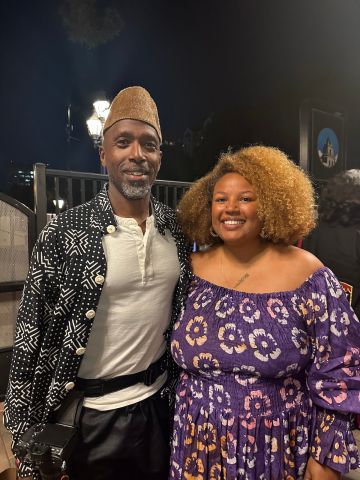
Source:Courtesy
One of our favorites from the weekend was definitely Memories of Love Returned by Ugandan-American actor and director Ntare Guma Mbaho Mwine, which tied for a Best Documentary Feature win at the Festival. The film tells the story of his encounter with Ugandan photographer Kibaate Aloysius Ssalongo. After randomly stumbling upon the photographer’s studio, Mwine was met with stunning portraits of the people of Mbirizi, some dating back to the 1960’s.
5. Julie Dash is the first African-American woman to have a wide theatrical release of her feature film in the U.S
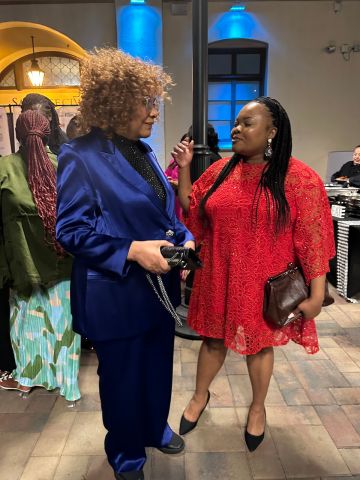
Source:Courtesy
Dash’s 1991 film Daughters of the Dust tells the story of three generations of Gullah women in the Peazant family as they prepare to leave their home on St. Helena Island and migrate North at the turn of the century (the film is set in 1902).
Currently the Diana King Endowed Professor at Spelman College’s Department of Art & Visual Culture, Dash also told GlobalGrind the advice she offers her students:
“It’s about finding your own voice and standing in your truth and sharing that with the world, and a lot of my students are making films that are healing themselves, it’s about self-healing.”
6. ‘SWAGGER’ Actor Ozie Nzeribe received a Trailblazer Award at the Silicon Valley African Film Festival
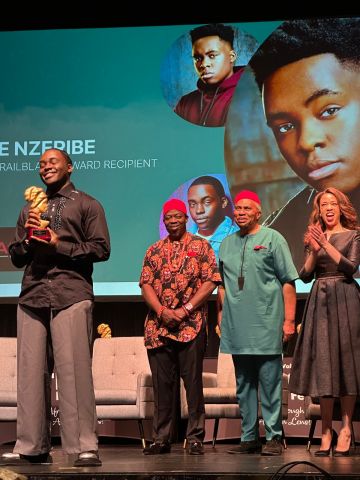
Source:Courtesy
“It feels amazing to be honored in anything, you know?” the Swagger actor told GlobalGrind. “I’m jumping for joy, but this specifically because it hits close to home because I’m proud proud Nigerian man and to accept an award on behalf of my people, where I’m from, is amazing. I’m very happy.”
7. Dr. John Kani honored for uplifting the image of Africa on a global stage
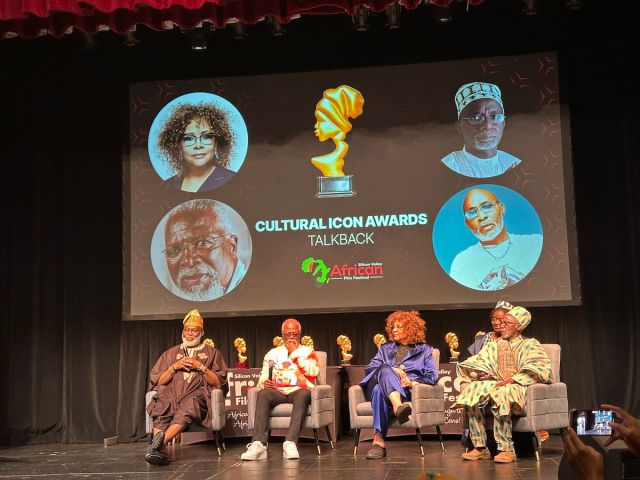
Source:Courtesy
“We do our work because we believe,” Dr. John Kani told GlobalGrind about being honored by SVAFF. “We do our work because we have a mission to our communities. We know that we in Africa need to regain our dignity, we need to regain and retake our culture. There’s been so much cultural appropriation. So when that work you do, not just entertaining but informing and educating, mobilizing everybody on all causes that affect the Black man and the Black woman on this earth, and suddenly someone says, ‘By the way you’re doing good work,’ this is so gratifying. The award simply says, ‘Hold one second, we just wanna say thank you.’ And after thank you, there’s work to be done. That’s how I feel tonight that I’m being acknowledged and I’m being honored on something I do as my duty as a man, as an African.”


